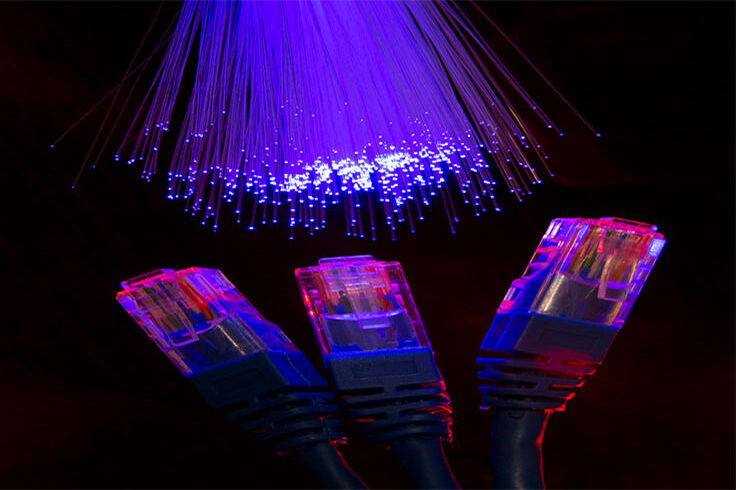Fiber vs. DSL vs. 5G: Which Internet Connection Fits Your Life Best?
When it comes to internet options, things can get confusing fast, fiber, DSL, 5G… What’s the real difference? And more importantly, which one actually makes sense for your home or business?
If you’re tired of buffering, slow downloads, or unreliable connections, this guide is for you. We’ll walk you through the basics of each type, no tech talk, just real answers, and help you figure out which one suits your daily needs.
Whether you’re working from home, streaming movies, or just browsing the web, here’s what you need to know.
What Is Fiber Internet?
Fiber is the gold standard of internet connections. A fiber optic service sends data through super-thin glass or plastic cables at nearly the speed of light. Sounds high-tech? It is. But what matters is that it gives you crazy fast speeds, crystal-clear video calls, and rock-solid stability.
If you’ve ever had a video freeze mid-meeting or your game lag right before you score, a fiber internet connection fixes that.
Why people love it:
- It’s lightning fast (yes, really).
- No more buffering or signal drops.
- It can handle your smart TV, work calls, and kids’ tablets all at once.
Fiber connection is ideal if:
- You run a business from home or have a remote team.
- Your household streams, games, and downloads nonstop.
- You just want the best and most reliable internet out there.
What About DSL?
Now, let’s talk about DSL. It’s been around for a while and runs through your regular telephone lines. While it may not be the newest tech, it’s still a decent choice in many areas, especially if you’re not using the internet for much beyond the basics.
What’s good about it:
- It’s easy to find even in smaller towns or rural areas.
- It’s usually more affordable.
- Great if your needs are simple.
What’s not so great:
- Speeds can be underwhelming, especially for uploading.
- The farther you are from the provider, the weaker the signal.
- Not built for heavy streaming, video calls, or gaming.
DSL is best if:
- You only need internet for emails, browsing, and banking.
- Fibre or 4G aren’t available in your area.
- You’re on a tight budget and don’t mind slower speeds.
How Does 4G Internet Work?
If you’ve ever used mobile data on your phone, you already know what 5G is. The difference? With 5G internet for your home, you use a SIM card and a wireless router instead of cables. It’s quick to set up and doesn’t need any drilling or technicians.
Why people choose it:
- It’s portable and you can take it anywhere.
- You can set it up yourself in minutes.
- Ideal for temporary homes or rental spaces.
Things to keep in mind:
- Some plans have data limits or slow down after a certain point.
- Performance can drop during peak hours.
- Depends heavily on your mobile signal quality.
4G is perfect for:
- People who move often or live in short-term rentals.
- Those who need a backup connection.
- Areas where fiber or DSL just don’t reach.
A Quick and Honest Comparison
Let’s put it simply:
- Speed: Fibre is king. 5G comes second. DSL is last.
- Stability: Fibre wins again, followed by DSL. 5G can be spotty.
- Availability: DSL is easiest to find, then 5G. Fibre is still expanding.
- Price: DSL is often the cheapest, fiber is most expensive (but worth it).
A fiber optic service might cost a bit more upfront, but if your work or daily life depends on a strong, fast fiber internet connection, it pays off in the long run.
Why Speed Isn’t Just for Netflix
You might think fast internet only matters if you’re binge-watching shows. But in reality, speed plays a huge role in everything from uploading work files to attending virtual meetings or running smart home devices. If your child is studying online while you’re on a Zoom call and someone else is gaming, slow internet can ruin everyone’s day. A strong fiber internet connection means you don’t have to compromise.
When Weak Internet Affects Your Day
Let’s be honest, nothing is more frustrating than a slow or unstable internet. Whether your file won’t upload, your meeting glitches out, or your favorite show keeps buffering, it takes a toll on your time and patience. DSL and 5G can be okay for light tasks, but they often fall short when life gets busy. A fiber optic service gives you peace of mind, especially if your household has multiple people online at once. No more digital chaos.
Which One Should You Go For?
It really comes down to how you use the internet:
- Go for fiber if speed, stability, and multitasking matter. Perfect for remote workers, students, families, and businesses.
- Stick with DSL if your needs are light, and you’re mainly browsing, emailing, and paying bills.
- Choose 5G if you need flexibility or a quick fix, especially in temporary spaces.
The Clear Winner: Fibre for the Future
Let’s face it, we depend on the internet for just about everything. And that’s not changing any time soon. So if you’re looking for something fast, reliable, and ready to support your lifestyle now and years from now, a fibre optic service is the way to go.
With a strong fibre internet connection, you’ll stop worrying about lag, poor video quality, or being disconnected during important tasks. Whether you’re building a smart home, running a business, or just want to stream in peace, fiber keeps up.
Not sure what’s available in your area? Reach out and we’d love to help you find the best internet option for your space, budget, and lifestyle.




